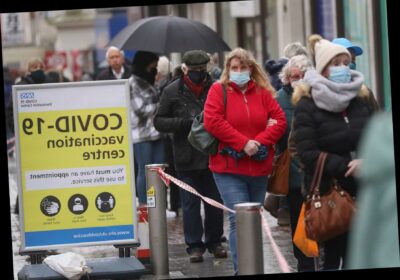Covid cases could be as low as at end of first wave in just TWO WEEKS raising hopes for lockdown easing

COVID cases could be as low as they were towards the end of last year's first wave in a fortnight raising hopes of lockdown easing, a top scientist believes.
In another boost, a single vaccine dose offers 67 per cent protection from the virus after three weeks, details logged on the Zoe Covid symptom app reveals.
🦠 Read our coronavirus live blog for the latest news & updates
Professor Tim Spector, lead scientist on the app used by 4.5 million people, said the data fuels hopes Britain's vaccine rollout will eventually have "knocked the virus on the head".
The King's College epidemiologist told Sky's Sophy Ridge on Sunday the R rate has been "persistently below" one since January, with infections down 80 per cent.
Prof Spector said: "It currently means we are in a similar state to where we were in October.
"And if we look at the trajectories of where we are going, in a couple of weeks we are going to be where we were at the end of May, beginning of June."
JAB BOOST
The average number of people testing positive a day in the week ending May 31, 2020 was 1,396, government figures show.
With ramped-up testing now identifying far more cases, the rolling seven-day average on February 10 was 13,896.
The Zoe app estimates just under 250,000 people currently have Covid symptoms, compared to around 88,000 on June 11 last year.
As virus rates continue to plunge, less than one in 500 people should soon have symptomatic Covid which "in my view means we should be able to reduce some of these restrictions", Prof Spector added.
The Zoe app was also showing "very good data" on the vaccine, with around a third of a million people logging their first dose information, Prof Spector revealed.
It comes after Britain is believed to have smashed its coronavirus vaccine target yesterday.
All 15 million Brits in the top four most vulnerable categories are on course to receive the jab by Monday in a huge boost in the fight against the bug.
Vaccine details logged by 50,000 people, mainly health workers, on the ZOE app showed 67 per cent protection against the virus after three weeks.
IF we look at the trajectories of where we are going in a couple of weeks we are going to be where we were at the end of May, beginning of June
The data showed anyone receiving a single dose has three times less risk than someone who isn't vaccinated.
ProfSpector added: "That is a better rate than people thought from a singe jab.
"That, combined with the data we are seeing, gives me a lot of reason to be optimistic that we are going to be in a much better place in two to four weeks time and can start to reduce some of these restrictions."
There was a "consistent fall" after two weeks of the first jab, with infections down 67 per cent after three to six weeks.
He added: "If that was around the country we'd have really knocked this virus on the head.
"We are going to drive the rates of this virus really low".
The data showed the government's policy of delaying the second jab by up to 12 weeks "looks like it's paying off".
Figures released on Saturday revealed that 14,012,224 doses of the Pfizer and Oxford vaccines have been administered in the UK.
But this total does not include the 503,116 jabs given out on Thursday.
With the current rate of vaccination, it is highly likely that the government's target of vaccinating 15 million people was hit yesterday.
Source: Read Full Article




